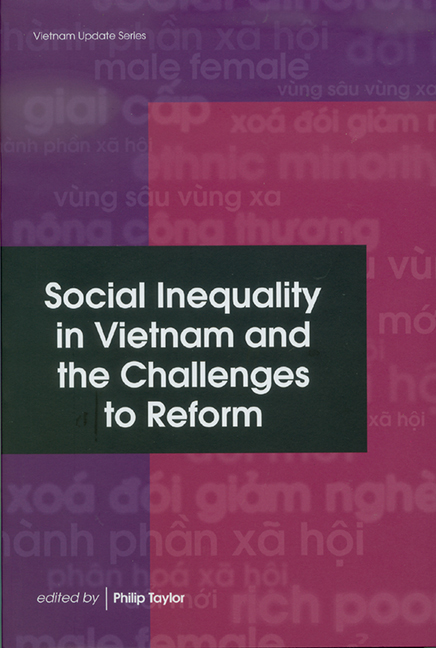Book contents
- Frontmatter
- Contents
- List of Tables
- List of Figures
- Preface
- Introduction: Social Inequality in a Socialist State
- 1 Vietnam's Recent Political Developments
- 2 Vietnam's Recent Economic Reforms and Developments: Achievements, Paradoxes, and Challenges
- 3 Behind the Numbers: Social Mobility, Regional Disparities, and New Trajectories of Development in Rural Vietnam
- 4 From Collectivization to Globalization: Social Differentiation in a Muong Ethnic Community of Vietnam
- 5 Political Capital, Human Capital, and Inter-generational Occupational Mobility in Northern Vietnam
- 6 Social Disparities in Vietnam: The Case of Poverty Reduction and Educational Attainment
- 7 Redressing Disadvantage or Re-arranging Inequality? Development Interventions and Local Responses in the Mekong Delta
- 8 The Politics of Land: Inequality in Land Access and Local Conflicts in the Red River Delta since Decollectivization
- 9 Female Garment Workers: The New Young Volunteers in Vietnam's Modernization
- 10 Class, Nation, and Text: The Representation of Peasants in Vietnamese Literature
- 11 Leisure and Social Mobility in Ho Chi Minh City
- Index
- About the Contributors
- Publications in the Vietnam Update Series
Introduction: Social Inequality in a Socialist State
Published online by Cambridge University Press: 21 October 2015
- Frontmatter
- Contents
- List of Tables
- List of Figures
- Preface
- Introduction: Social Inequality in a Socialist State
- 1 Vietnam's Recent Political Developments
- 2 Vietnam's Recent Economic Reforms and Developments: Achievements, Paradoxes, and Challenges
- 3 Behind the Numbers: Social Mobility, Regional Disparities, and New Trajectories of Development in Rural Vietnam
- 4 From Collectivization to Globalization: Social Differentiation in a Muong Ethnic Community of Vietnam
- 5 Political Capital, Human Capital, and Inter-generational Occupational Mobility in Northern Vietnam
- 6 Social Disparities in Vietnam: The Case of Poverty Reduction and Educational Attainment
- 7 Redressing Disadvantage or Re-arranging Inequality? Development Interventions and Local Responses in the Mekong Delta
- 8 The Politics of Land: Inequality in Land Access and Local Conflicts in the Red River Delta since Decollectivization
- 9 Female Garment Workers: The New Young Volunteers in Vietnam's Modernization
- 10 Class, Nation, and Text: The Representation of Peasants in Vietnamese Literature
- 11 Leisure and Social Mobility in Ho Chi Minh City
- Index
- About the Contributors
- Publications in the Vietnam Update Series
Summary
As one of the world's few states that remains nominally socialist, Vietnam is today caught up in a set of profound changes. These changes are reshaping its society in a manner that the expounders of this nineteenth century doctrine and the founders of the twentieth century states who drew upon it for inspiration could scarcely have imagined. At the forefront of such changes has been the opening up of a substantial role for private economic interests, the intensification of commerce and integration with the global capitalist economy. Political institutions from the National Assembly to mass organizations such as the Farmer's Association have had to contend with the decentralization of the economic landscape and now serve as venues for the voicing of evermore diverse social interests. The media holds up a mirror to an increasingly pluralist society, and emerging civil society groupings, sectoral interests, and localist emphases have dragged the initiative for setting political and economic priorities away from the bureaucracy and the country's sole political party. The society has become more urbanized, the popularization of technologies such as motorbikes, the Internet, and mobile phones has transformed the way people communicate with each other. A flow of human movements both within the country and across borders has refigured people's relationships to place and home. The growing importance of particularist cultural, ethnic, and religious affiliations, both new and reaffirmed, gives voice to the complexity and dissonance of Vietnamese people's temporal and spatial experiences and to the tensions and divisions that have opened up within their society.
This book is about one of the most challenging of these changes in reform-era Vietnam, the emergence of social inequalities. Social inequality refers to differences between people in their material well-being, their social position, cultural standing, or ability to influence others. It also refers to disparities in people's ability to ensure that they have a better future and that their children are secure, healthy, and have viable livelihoods.
- Type
- Chapter
- Information
- Publisher: ISEAS–Yusof Ishak InstitutePrint publication year: 2004



